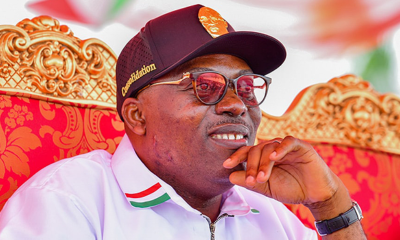International News
Martial Law: South Korean President Survives Impeachment
South Korean President, Yoon Suk Yeol narrowly avoided impeachment on Saturday after a brief and controversial declaration of martial law.
Despite widespread protests outside parliament, lawmakers from Yoon’s ruling People Power Party (PPP) boycotted the vote, effectively preventing the motion from reaching the required two-thirds majority for approval.
Yoon’s martial law declaration, which saw troops deployed to parliament, shocked the nation and drew international criticism.
RELATED NEWS: Martial Law: South Korea Opposition Files Impeachment Motion Against President Yoon
The decree, announced late Tuesday, aimed to “eliminate anti-state elements,” but was quickly reversed after a wave of backlash.
His party’s lawmakers staged a near-total boycott during the impeachment vote, resulting in its failure.
National Assembly speaker Woo Won-shik confirmed that the vote was invalid due to insufficient participation.
“The number of members who voted did not reach the required two-thirds majority,” Woo said. “It is very regrettable that a vote could not even be held on such a significant national issue,” he added, criticizing the PPP for its failure to engage in the democratic process.
The decision disappointed the massive crowds that had gathered outside parliament, with some protestors numbering up to one million according to organizers.
As PPP lawmakers left the chamber without voting, demonstrators expressed their frustration.
“Even though we didn’t get the outcome we wanted today, I am neither discouraged nor disappointed because we will get it eventually,” said Jo Ah-gyeong, a 30-year-old protester. “I’ll keep coming here until we get it,” she told AFP.
Opposition leaders vowed to continue their fight, promising to push for a new impeachment motion as early as Wednesday.
Many protesters also pledged to keep demonstrating until Yoon is removed from office. “I will impeach Yoon Suk Yeol, who has become the worst risk for South Korea, at any cost,” said opposition leader Lee Jae-myung.
Before the vote, Yoon, 63, apologized for the turmoil caused by his actions. “I caused anxiety and inconvenience to the public. I sincerely apologise,” he said, adding that he would leave decisions about his political future to his party. “I will entrust the party with measures to stabilise the political situation, including my term in office,” he said.
Despite Yoon’s apology, the PPP’s internal divisions remain apparent. Only three PPP lawmakers—Ahn Cheol-soo, Kim Yea-ji, and Kim Sang-wook—cast votes in favor of the impeachment motion.
The party defended its stance, saying it blocked the vote to avoid “severe division and chaos” and pledged to resolve the crisis in a “more orderly and responsible manner.”
Yoon’s approval rating has plummeted to a record low of 13%, and public frustration continues to mount.
“The public will not forgive him,” said 63-year-old retiree Lee Wan-pyo. “I just want him to step down,” said 70-year-old housewife Han Jeong-hwa.
The martial law episode, which included soldiers sealing off the National Assembly and helicopters landing on the roof, has drawn comparisons to South Korea’s autocratic past.
Nearly 300 soldiers were sent to lock down parliament, but MPs managed to resist the move, with some climbing walls to enter the building.
The martial law order was voted down after members of parliament successfully thwarted the military intervention.
As investigations into alleged insurrection unfold, experts suggest the failure of the impeachment vote signals a prolonged political crisis for Yoon.
“We will have a politically dead president—basically unable to govern any longer—and hundreds of thousands coming to the streets every week until Yoon is removed,” said Vladimir Tikhonov, a professor of Korean Studies at the University of Oslo.
The international community, including the United States, has expressed concern over the unfolding crisis.
U.S. Secretary of State Antony Blinken urged South Korea’s government to uphold democratic processes in a call with his Korean counterpart, Cho Tae-yul.
International News
Massive 7.7 Magnitude Earthquake Rocks Myanmar, Shakes Southeast Asia
A powerful 7.7-magnitude earthquake struck central Myanmar on Friday, shaking the region and sending tremors as far as Thailand and China.
The quake’s epicenter was located in the Sagaing region, near Mandalay, Myanmar’s second-largest city, home to around one million people and renowned for its historic temple complexes.
Panic erupted as buildings swayed and dust filled the air.
READ ALSO: Powerful 6.8-Magnitude Earthquake Hits China, Dozens Killed
In Mandalay, videos shared online showed terrified residents rushing out of residential towers while traffic came to a sudden halt.
Reports indicate that a major bridge spanning the Irrawaddy River collapsed into the water in a cloud of dust and debris.
The quake was felt as far as Bangkok, Thailand’s capital, where video footage showed a partially constructed building in Chatuchak Park crumbling to the ground.
Thai authorities reported that 43 people were trapped in the wreckage, while seven others sustained injuries.
In Chiang Mai, a resident described feeling the tremors for about ten seconds before fleeing into the streets.
In Myanmar’s commercial hub, Yangon—about 380 miles from the epicenter—residents also experienced the powerful shaking.
One resident recalled, “We felt the quake for about a minute, then ran out of the building.
It was very sudden and very strong.” Another noted that phone networks in the city, home to around 8 million people, briefly went down but were later restored.
Myanmar, one of Asia’s poorest nations, is already grappling with the effects of a brutal civil war sparked by a military coup over four years ago.
The conflict has devastated the economy, and the country remains ill-equipped to handle a major natural disaster of this scale.
The Sagaing region, where the earthquake struck, is a war zone with multiple factions—including the ruling junta, pro-military militias, and rebel groups—fighting for control.
The ongoing violence has made travel by road or river extremely dangerous, posing significant challenges to delivering emergency aid and assessing the full extent of the damage.
Tremors were also felt in China’s southwestern Yunnan province, underscoring the quake’s intensity.
Authorities across the region are now assessing the situation, with emergency teams mobilizing in both Myanmar and Thailand.
International News
Samsung Electronics Co-CEO, Han Jong-hee Dies At 63

Han Jong-hee, co-CEO of Samsung Electronics and a driving force behind the company’s dominance in the global television market, has died of a heart attack at the age of 63, the company confirmed on Tuesday.
“He died from cardiac arrest today,” a Samsung spokesperson stated, adding that Han is survived by his wife and three children.
Having joined the company in 1988, Han played a significant role in shaping Samsung’s television business.
READ MORE: Samsung Reports Worst Quarterly Profits In 14 Years
His leadership was instrumental in the launch and success of the company’s high-end LED TVs, which helped establish Samsung as a global leader in the industry.
“Han was central in the unveiling of Samsung’s world-class LED TVs,” the company noted in a biography published earlier this month. “His numerous other innovations enabled the company to continually demonstrate its technology leadership.”
His efforts ensured that Samsung maintained its position as a dominant force in the global television market.
Han’s death comes at a time when Samsung Electronics is grappling with challenges in the AI chip sector.
The company has been facing difficulties in meeting Nvidia’s standards, while its South Korean competitor, SK Hynix, has emerged as the leading supplier of high-bandwidth memory (HBM) chips for Nvidia’s AI processors.
Chairman Lee Jae-yong recently underscored the urgency of the situation, urging Samsung to adopt a “do-or-die” approach to overcome the growing challenges in the AI industry.
Last October, the company acknowledged it was facing a “crisis,” citing concerns over its “fundamental technological competitiveness and the future of the company.”
International News
Pope Francis To Return To Vatican After Month-Long Treatment
Pope Francis will on Sunday be discharged from Rome’s Gemelli hospital, where he has been receiving treatment since February 14 for breathing difficulties and pneumonia.
The 88-year-old pontiff will return to his residence at Saint Martha’s House in the Vatican, where doctors have advised that he undergo “a long convalescence… of at least two months.”
Speaking to reporters on Saturday, Dr. Sergio Alfieri explained that while the pope’s health is improving, further recovery is best achieved at home.
READ ALSO: Pope Francis’ Condition Improving, Says Vatican
“Further progress will take place at his home, because a hospital — even if this seems strange — is the worst place to recover because it’s where one can contract more infections,” Alfieri said.
Dr. Luca Carbone, another physician at Gemelli, added that there are positive signs in the pope’s condition. “We hope that he will soon be able to resume his normal activities,” he stated.
Before leaving the hospital, Pope Francis is expected to greet the public and offer a blessing from a hospital balcony after the Angelus prayers on Sunday, marking his first appearance in weeks.
Speculation about a possible resignation has been circulating due to the pope’s prolonged absence from public duties, but Vatican officials have firmly denied such claims.
When asked if the topic had been discussed, Vatican Secretary of State Pietro Parolin was clear in his response: “No, no, no, absolutely not.”
The pope, who had part of a lung removed in his youth, has received an outpouring of prayers and well-wishes from Catholics worldwide.
Supporters have been gathering outside Gemelli hospital, leaving flowers, candles, and messages of encouragement.
His hospitalization, the longest of his papacy has led to questions about how Easter celebrations will be handled in his absence.
However, Vatican officials remain optimistic about his gradual return to his duties in the coming weeks.





















